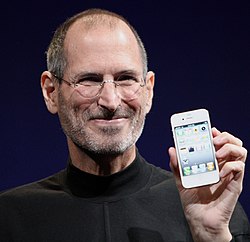Steve Jobs Quote
Remembering that I'll be dead soon is the most important tool I've ever encountered to help me make the big choices in life.Almost everything--all external expectations, all pride, all fear of embarrassment or failure--these things just fall away in the face of death, leaving only what is truly important. Remembering that you are going to die is the best way I know to avoid the trap of thinking you have something to lose. You are already naked. There is no reason not to follow your heart. No one wants to die. Even people who want to go to heaven don't want to die to get there. And yet, death is the destination we all share. No one has ever escaped it, and that is how it should be, because death is very likely the single best invention of life. It's life's change agent. It clears out the old to make way for the new.
Remembering that I'll be dead soon is the most important tool I've ever encountered to help me make the big choices in life.Almost everything--all external expectations, all pride, all fear of embarrassment or failure--these things just fall away in the face of death, leaving only what is truly important. Remembering that you are going to die is the best way I know to avoid the trap of thinking you have something to lose. You are already naked. There is no reason not to follow your heart. No one wants to die. Even people who want to go to heaven don't want to die to get there. And yet, death is the destination we all share. No one has ever escaped it, and that is how it should be, because death is very likely the single best invention of life. It's life's change agent. It clears out the old to make way for the new.
Related Quotes
It doesn't matter who you are or where you come from or what you look like or who you love. It doesn't matter whether you're black or white or Hispanic or Asian or Native American or young or old or r...
About Steve Jobs
Jobs was born in San Francisco in 1955 and adopted shortly afterwards. He attended Reed College in 1972 before withdrawing that same year. In 1974, he traveled through India, seeking enlightenment before later studying Zen Buddhism. He and Wozniak co-founded Apple in 1976 to further develop and sell Wozniak's Apple I personal computer. Together, the duo gained fame and wealth a year later with production and sale of the Apple II, one of the first highly successful mass-produced microcomputers.
Jobs saw the commercial potential of the Xerox Alto in 1979, which was mouse-driven and had a graphical user interface (GUI). This led to the development of the largely unsuccessful Apple Lisa in 1983, followed by the breakthrough Macintosh in 1984, the first mass-produced computer with a GUI. The Macintosh launched the desktop publishing industry in 1985 (for example, the Aldus Pagemaker) with the addition of the Apple LaserWriter, the first laser printer to feature vector graphics and PostScript.
In 1985, Jobs departed Apple after a long power struggle with the company's board and its then-CEO, John Sculley. That same year, Jobs took some Apple employees with him to found NeXT, a computer platform development company that specialized in computers for higher-education and business markets, serving as its CEO. In 1986, he bought the computer graphics division of Lucasfilm, which was spun off independently as Pixar. Pixar produced the first computer-animated feature film, Toy Story (1995), and became a leading animation studio, producing dozens of commercially successful and critically acclaimed films.
In 1997, Jobs returned to Apple as CEO after the company's acquisition of NeXT. He was largely responsible for reviving Apple, which was on the verge of bankruptcy. He worked closely with British designer Jony Ive to develop a line of products and services that had larger cultural ramifications, beginning with the "Think different" advertising campaign, and leading to the iMac, iTunes, Mac OS X, Apple Store, iPod, iTunes Store, iPhone, App Store, and iPad. Jobs was also a board member at Gap Inc. from 1999 to 2002. In 2003, Jobs was diagnosed with a pancreatic neuroendocrine tumor. He died of tumor-related respiratory arrest in 2011; in 2022, he was posthumously awarded the Presidential Medal of Freedom. Since his death, he has won 141 patents; Jobs holds over 450 patents in total.
